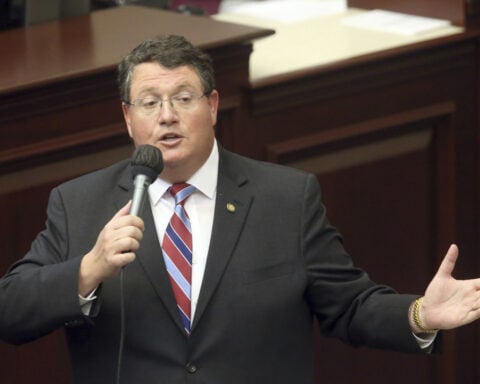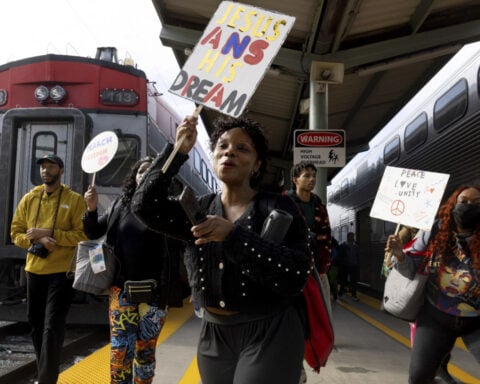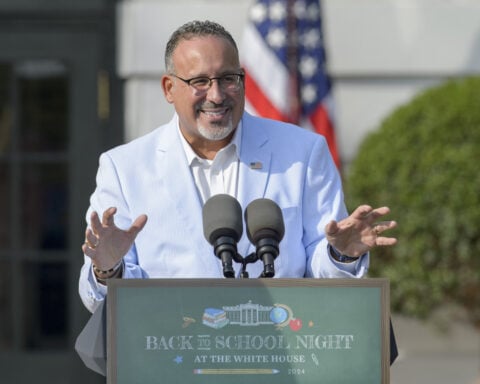One study found the presence of Black math teachers increased the likelihood that Black students enroll in rigorous math classes. Another found that Black students taught by at least one Black teacher from kindergarten through third grade were 13% more likely to graduate from high school and 19% more likely to attend college than same-race peers who did not have a Black teacher.
Still, the teacher workforce remains stubbornly white-dominated. Why? Research shows problematic certification measures, adverse working conditions and discriminatory hiring practices contribute to keeping Black people from becoming teachers or keeping their teaching positions.
Certification exams are barriers to entry
Obtaining a professional license is a critical milestone in a teacher’s career. Yet licensure policies and exams long have kept Black teachers out, similar to race-based policies such as literacy tests that once prevented Black people from voting in the segregated South.
By several measures, standardized tests have been found to be biased against people of color. Research shows they contain culturally biased questions that privilege white test-takers.
What’s more, certification and licensing exams prevent the entry of Black people into teaching and determine which teachers are retained. As a result, from 1984 to 1989, about 21,500 Black teachers lost their jobs, according to one study of the impact of reliance on licensure exams and policies.
This gatekeeping function is especially troublesome because other studies show exam results are poor predictors of teacher effectiveness. In one study, Black teachers in North Carolina with low exam scores nonetheless had positive outcomes on Black student achievement.
Difficult work conditions lead to turnover
Black teachers have the highest rate of turnover among teachers, both white and nonwhite. When asked to reflect on their careers, longtime Black teachers say they face constant racist microaggressions from fellow teachers, non-Black parents and district personnel.
Black male teachers in particular say their expertise is overlooked and that they are forced to play disciplinarian for Black boys. Other studies show Black teachers are systematically sorted into schools with fewer resources, chronic turnover and leadership instability.
Last-in-first-out hiring policies exacerbate the issue. Layoffs of this nature disproportionately affect the students most often taught by beginning teachers and teachers of color.
All of this makes teaching a precarious profession for Black educators.
Discriminatory hiring practices
Teacher hiring practices have made this cycle, and they can break it, too.

One study found equally qualified Black teacher applicants receive fewer job offers than white candidates. When hired, Black teachers are more likely to be selected by principals of color, and they, too, are a disproportionately small percentage of school leaders.
Principals say they seek teachers who best fit their school culture. Yet research shows that definitions of “fit” rely on subjective traits and personal attributes, and often this means excluding Black teachers.
The nation faces a massive teacher shortage, but there is no shortage of potential teachers of color. Seven decades after Brown, it is a lack of willingness to hire and retain them that is missing.

Diana D'Amico Pawlewicz, Ph.D. has received funding to support her research from The Spencer Foundation.
Andrea Guiden Pittman, Ph.D. receives funding from The Spencer Foundation to support her research.
Andrene J. Castro receives funding from The Spencer Foundation to support this research.
Marvin G. Powell receives funding from The Spencer Foundation to support his research.
Source: The Conversation

 Germany's economy shrank for the second consecutive year in 2024
Germany's economy shrank for the second consecutive year in 2024
 Italy, Albania, UAE sign deal for energy subsea interconnection
Italy, Albania, UAE sign deal for energy subsea interconnection
 European shares advance as bond yields ease; soft inflation powers UK stocks
European shares advance as bond yields ease; soft inflation powers UK stocks
 Bayern Munich signs US youngster Bajung Darboe from LAFC
Bayern Munich signs US youngster Bajung Darboe from LAFC
 Novak Djokovic breaks a tie with Roger Federer for the most Grand Slam matches in tennis history
Novak Djokovic breaks a tie with Roger Federer for the most Grand Slam matches in tennis history
 China's RedNote: what you need to know about the app TikTok users are flocking to
China's RedNote: what you need to know about the app TikTok users are flocking to
 Black students are more likely to attend college when they have Black teachers at the K-12 level.
Black students are more likely to attend college when they have Black teachers at the K-12 level.







